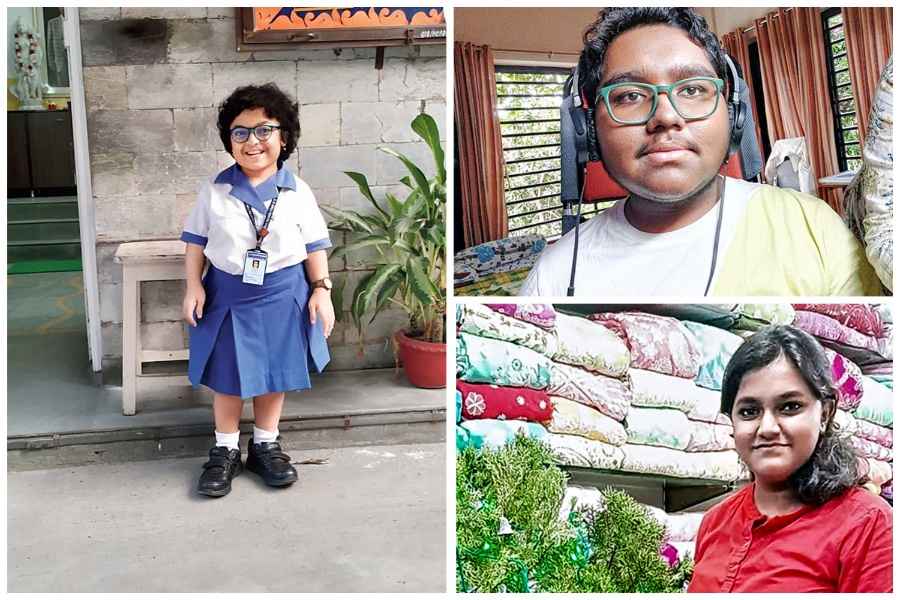City students beat odds to achieve success


Many children stuck to studies fighting odds that grown-ups will be daunted to face. These children persisted and crossed one hurdle after another — physical, psychological, social — with flying colours.
Some such children who took their ICSE and ISC exams this year.
Eshitha Barua, GD Birla Centre for Education, Ranikuthi
ISC, 98.75 per cent
The girl, at 17, is all of three feet and eight inches. Throughout her growing up years, she had been subject to “sympathy or bullying” because of her stature.
After scoring 98.75 per cent, she told her mother that “these marks are what I deserved” and were not because an examiner has “shown mercy on me”.
Eshitha was upset when the Class X board exams were scrapped in 2021 because of the Covid pandemic.
“I have always faced comments from neighbours or peers that the school or teachers were partial towards me. In Class X, there was no board exam. I could prove my worth in my first public exam (ISC),” she told The Telegraph.
“Not that I believe in proving myself to others. But I want people to know that people like me might be ostracised but we do not step back.”
Her scores are 96 in English, 99 in Bengali, 100 in elective English and sociology and 98 in history.
Her condition is called multiple epiphyseal bone dysplasia.
“Multiple epiphyseal bone dysplasia is a genetic condition that impacts bone growth, which becomes irregular and results in short stature,” said Apurba Ghosh, director, Institute of Child Health.
Eshitha said she had never appreciated sympathy because it is unwanted and undermines her abilities.
“Because of my height, my peers would many times tell me that I would not be able to do many things.... Every time I cannot go to the authorities to complain,” she said.
Eshitha said she learnt quite early in life that “breaking down” is important too.
“When you break down you learn to stand up. I am grateful to my teachers in school who have been a second set of parents for me and have supported me mentally,” she said.
Her mother, who is a teacher in another school, said she had to take off 30 minutes early on some days so she could pick up her daughter from school. “She needs help to board a rickshaw because her legs are short. Some of my colleagues would say that I am privileged because I am being let off early,” she said.
Sreejato Sutar, Vivekananda Mission School, Joka
ICSE, 87.6 per cent
Every evening, the 16-year-old would go out to the field to see his friends play football while he would cheer them sitting in his wheelchair.
Muscular dystrophy, a genetic disease that causes muscle degeneration, limits him to a wheelchair.
But it has failed to limit his spirit. His teachers describe him as a “sport”.
Sreejato scored 87.6 per cent in ICSE. His marks are 94 in English, 99 in art, 79 in math, 78 in science, 86 in history, civics and geography and 80 in Bengali. “I go out with them because I enjoy their company, so what if I cannot play?” he said.
Despite his muscle strength being low, Sreejato refused to take a writer for the exam.
“His writing speed has reduced from what it was. And someone has to put his hand on the table so he can write. But despite all these challenges, he refused a writer. He was granted extra time but he did not require it,” said mother Mallika Das Sutar.
Sreejato would tell his mother that he did not like the idea that he would take extra time while his friends submitted their papers on time.
“Just because I use a wheelchair, I cannot sit back at home and not study. My restriction in movement cannot stop me from going to the exam hall or discussing a match with my friends,” he said.
His mother said Sreejato is fully aware of his medical condition and there are times when the parents would draw inspiration from him.
“His story is inspirational because of the boy’s approach to everything and how he takes it sportingly,” said Arnab Chanda, rector, Vivekananda Mission School.
Devdatta Dutta Adamas, International School, Belgharia
ICSE, 86.8 per cent
A few months before her exam, the 15-year-old found it difficult to concentrate on her studies.
She was restless and her parents initially thought she was playing truant.
It was much later that they realised the mistake was theirs because they had stopped her treatment of Attention Deficit Hyperactivity Disorder (ADHD) during the pandemic.
“It was when her results in the school exam turned out to be poor that our attention was drawn to it. We then consulted a psychiatrist and resumed her treatment,” said her mother, Sutanuka Dutta.
Devdatta has scored 86.8 per cent in ICSE. She scored 86 in English, 83 in Bengali, 89 in history, civics and geography, 87 in math, 89 in computer applications and 76 in science.
“It was a mistake to stop her treatment during the pandemic. Because she scored high marks in school exams, we thought she did not need treatment any more,” her mother said.
Now, even Devdatta realises that she cannot stop her treatment and her psychiatrist is “her friend”.